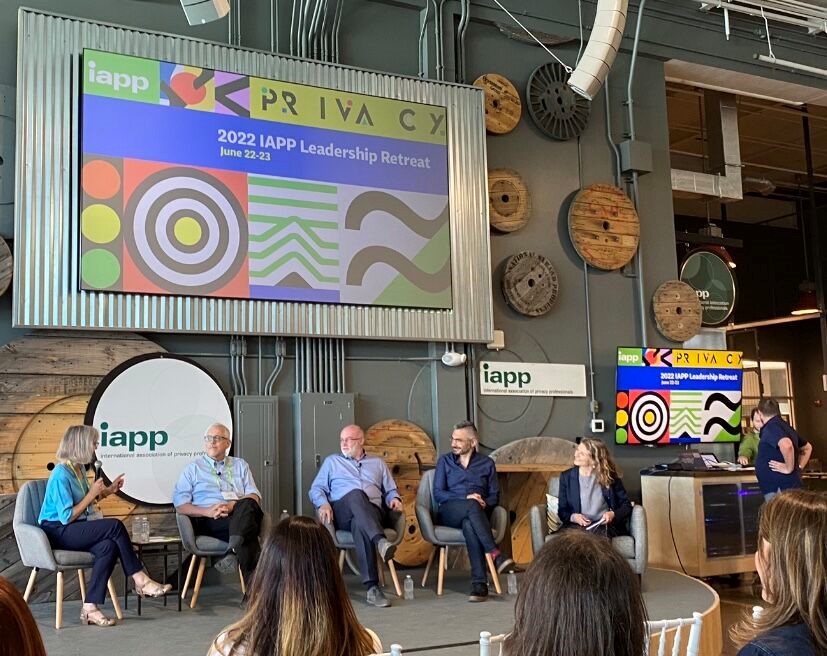Mette Birkedal Bruun speaks at the leadership retreat of the International Association of Privacy Professionals
On 22 June Centre Director Mette Birkedal Bruun gave a lecture in the session Privacy and Faith at the annual leadership retreat of the International Association of Privacy Professionals (IAPP) in Portsmouth, New Hampshire. Bruun had been invited to present the work of the Centre for Privacy Studies and her own research into religious aspects of early modern privacy to an audience of some 150 privacy legislators, lawyers, and tech experts, and to participate in a lively panel session with discussions among the speakers and with the audience.

Picture from the IAPP panel discussion of PRIVACY and Faith
(From left to right: Moderator Ruth Boardman and speakers James J. Hughes, Center for Applied Ethics, University of Massachusetts, Boston, Eric Stoddart, Centre for the Study of Religion & Politics, University of St. Andrews, Ara Norenzayan, Dept. of Psychology, University of British Columbia and Mette Birkedal Bruun, Centre for Privacy Studies, University of Copenhagen)
We asked Mette about her experience and insights from the international annual leadership retreat.
The IAAP primarily focuses on present-day privacy issues – how did they receive your perspective on privacy in the past?
The historical perspective reminds us that notions and experiences of privacy come with a huge explicit and implicit baggage of connotations. When we engage with other cultures, we are reminded of differences and similarities between human beings and their communities. History can do the same.
The historical perspective of the Centre for Privacy Studies demonstrate the deep Western – in fact European – roots of the notion of privacy. These insights resonated with the people at the IAPP retreat, many of whom are currently dealing with privacy legislation on a global level. When you go global, it is vital to know that privacy is not the same in all cultures; while in some cultures, the term ‘privacy’ has no meaning beyond data protection, for others, it is comprehensive, profound and highly charged. This raises the question: What is it that we protect when we protect privacy? This question is equally valid for historians and privacy practitioners – whether they are lawyers, IT experts, company consultants or legislators.
Did you gain new insights from meeting the legislators, lawyers, and tech experts and their take on privacy issues?
It was hugely inspiring to attend the IAPP leadership retreat, and I have had really stimulating conversations at the retreat and afterwards. Most importantly, perhaps, one of the participants asked this question: What can – and should - we who deal with contemporary privacy on a daily basis learn from history? – How do we implement what you are saying?
To my mind, history reminds us that there are human beings everywhere in systems that gather human data, even when it is super technological with black boxes galore. Each of these human beings is determined by a complex set of social, cultural, psychological et al. factors that influence their values and choices. This goes for the each of the human beings who make the laws, who administer the laws and turn them into administrative systems, the technicians who deal with the technical infrastructures and the officials who put these system into practice on a daily basis – but of course also the human beings who are governed by those laws and who navigate, trust or distrust these systems.
Historical research is well fitted to highlighting this human dimension because we deal with human beings in all of these capacities in their particular individual contexts.
It made a great impression that the person who asked that question and a lot of the other IAPP attendees are actually interested in our historical insights. This interest comes with a huge obligation for us not only to conduct our research in a way that our peers recognize as strong, precise and lucid, but also to find various ways of communicating what that research has to offer in a wider context.
Are there other insights from the retreat that you will take with you?
It is always a treat to speak with people who are driven, curious and interested and who have high standards for their contribution to society – whether they are inside or outside academia. For me, the IAPP retreat was such a moment.
